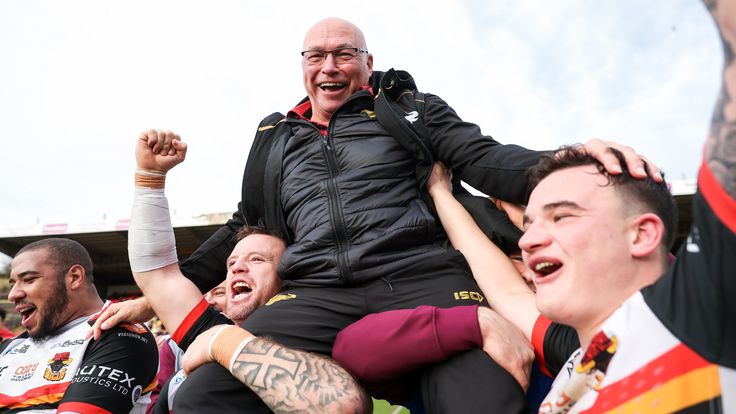Kear, now Bradford Bulls and Wales head coach, joined Sky Sports' Golden Point Podcast to reflect on what he has learnt in over three decades coaching rugby league at both club and international level

Saturday 8 May 2021 14:15, UK
Prior to taking his first steps as a head coach with perennial strugglers Bramley in the early 1990s, John Kear had barely known a life in rugby league beyond the boundaries of Castleford.
A 10-year professional career as a three-quarter and full-back with his hometown club where he had come through the youth set-up was followed becoming conditioner and then reserve-term coach for Cas.
But when he took charge of the Second Division club at McLaren Field in 1992, it set him on course for a coaching career that would see him scale the heights of the sport at club and international level in this country and beyond.
"I'd been at Castleford all my playing career, Castleford U19s prior to that and I was born down Wheldon Road, so all I'd seen was that," Kear told the Golden Point Podcast.
"It opened my eyes that there are different environments and different challenges in different environments."
Castleford greats Mal Reilly and John Sheridan, and later on cross-code coach Phil Larder, were all big influences on Kear's rugby league philosophy, as was former Great Britain coach Peter Fox from their time working alongside each other as radio pundits.
Another influence on his life were his teachers at school, which motivated Kear to take a teacher training course while still playing for Cas - skills which would also prove useful when he decided his future lay in coaching.
However, arriving at Bramley where he had little more than "about six balls and a set of cones" to work with forced Kear to think outside the box and reinforced one of his guiding principles of coaching that the whole is greater than the sum of the parts.
"What they had got was a group of lads who rolled their sleeves up, worked hard and were mates, Kear said. "That's what made coaching at that time really special.
"As a whole, we were pretty good, and we put some really good runs of wins together which hadn't really been the norm for Bramley prior to that.
"It helped shaped me, it gave me confidence, but it helped me realise you have to appreciate what you have got when you move to another environment, then attempt to improve that environment as best you can and also to use one or two nice tricks in the book."
A move to work in the RFL's player performance department under Larder, who was revamping the coaching scheme utilising knowledge from studying the great Jack Gibson's methods in Australia, further developed Kear's coaching and helped shape his views on developing young players.
From there, he was offered the opportunity to coach the nascent Paris Saint-Germain team in Super League and even took charge of the French national team for one match against Russia, with his international experience now including overseeing England at the 2000 Rugby League World Cup and now being in charge of the Welsh national squad.
The Challenge Cup is the competition Kear is perhaps most associated with though, having guided Sheffield Eagles to a memorable win over Wigan Warriors at Wembley in 1998 and doing likewise with Hull FC seven years later as they edged out Leeds Rhinos 25-24 in a thriller in Cardiff.
"The Sheffield one was very much about unity and belief, and we took some of that from the season before," Kear said, reflecting on how giving Wigan a scare before going to down 22-10 in the previous season's Premiership semi-finals was one of the big building blocks for that success.
"I had to build some confidence, which is why I came out with some outrageous statements at the time we were going to go to Wembley and win it before the start of the competition - and everybody, including the Sheffield players, thought I was bananas! Fortunately, they bought into it and grew and developed the self-confidence to do that.
"Whereas it was more coach-driven at Sheffield, it became a little more player-driven at Hull FC because you had people like Paul Cooke, Stephen Kearney and Richard Swain, who were very smart and experienced.
"There was a difference because they were two different groups, and as a coach I think you've got to realise that and adapt and amend your own driving force within that as to whether you pull or you push."
Kear's later coaching career has included preserving Wakefield Trinity's place in Super League, enjoy a spell with Batley Bulldogs where he was named Championship coach of the year in 2016 and, in his current club role, be tasked with overseeing the revival of Bradford Bulls as they aim to return to the top flight.
Throughout over three decades in coaching though, the 66-year-old's principles of getting the simple things right for the rest to follow have remained in place.
"The principles of playing any invasion sport remain the same: You've got to look after possession of the ball, you've got to turn the ball over on your own terms and you've got to defend as if your life depends upon it," Kear said.
"You do that when you're playing soccer, rugby union or netball, and you'll have a half-successful team. All of the of the little nuances are important, but you've got to have principles you stick to and I've had those all through.
"It's keep it simple and smart, and by doing that it makes it easy to understand and implement, and because it's easy to understand and implement they'll implement it with everything they've got.
"All I want my teams to be are hard to beat - and I think the vast majority have been."